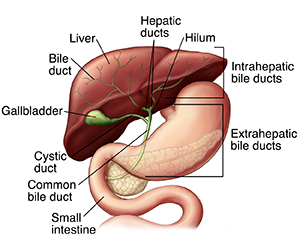A
B
C
D
E
F
G
H
I
J
K
L
M
N
O
P
Q
R
S
T
U
V
W
X
Y
Z
Click a letter to see a list of conditions beginning with that letter.
Click 'Topic Index' to return to the index for the current topic.
Click 'Library Index' to return to the listing of all topics.
Bile Duct Cancer: Introduction
What is cancer?
Cancer starts when cells in the body change (mutate) and grow out of control. To help understand what happens when you have cancer, it helps to look at how your body normally works. Your body is made up of tiny building blocks called cells. Normal cells grow when your body needs them, and die when your body doesn't need them any longer.
Cancer is made up of abnormal cells that grow even though your body doesn’t need them. In most cancers, the abnormal cells grow to form a lump or mass called a tumor. If cancer cells are in the body long enough, they can grow into (invade) nearby areas. They can even spread to other parts of the body (metastasize).
What are bile ducts?
The bile ducts are thin tubes that go from the liver and gallbladder to the small intestine. The ducts carry bile. Bile is a fluid made in the liver. It breaks down fats during digestion. The liver makes bile. Its stored in the gallbladder. During meals, the gallbladder sends bile through the common bile duct into the intestines to help with the digestion of food. There are two parts of the bile duct system that make this happen:
-
Intrahepatic bile ducts. This part of the bile duct system is inside the liver. It’s a network of many small tubes inside the liver that collect bile from liver cells. These ducts join into two (right and left) large hepatic ducts that exit the liver and join to become the common hepatic duct.
-
Extrahepatic bile ducts. These are the parts of the bile duct system that are outside the liver. After coming out of the liver, the right and left hepatic ducts join together in an area called the hilum to form the common hepatic duct. The cystic duct draining the gallbladder merges with the common hepatic duct to form the common bile duct. The common bile duct connects to the first part of the small intestine.

What is bile duct cancer?
Bile duct cancer can grow in any part of the bile ducts. Another term for bile duct cancer is cholangiocarcinoma. This cancer is grouped by type, depending on where it starts. Each type can cause different symptoms. The types are:
-
Perihilar (hilar) bile duct cancers (PHC). These grow in the hilum, where the main right and left bile ducts join as they are leaving the liver. Most bile duct cancers start here. You may hear PHC also called a Klatskin tumor.
-
Intrahepatic bile duct cancers. These grow in the tiny bile ducts inside the liver. Only a small number of bile duct cancers are this type.
-
Distal bile duct cancers. These tend to grow in the common bile duct near where it connects to the small intestine.
Talk with your healthcare provider
If you have questions about bile duct cancer, talk with your healthcare provider. Your healthcare provider can help you understand more about this cancer.
Online Medical Reviewer:
Jessica Gotwals RN BSN MPH
Online Medical Reviewer:
Melinda Murray Ratini DO
Online Medical Reviewer:
Todd Gersten MD
Date Last Reviewed:
4/1/2023
© 2025 The StayWell Company, LLC. All rights reserved. This information is not intended as a substitute for professional medical care. Always follow your healthcare provider's instructions.